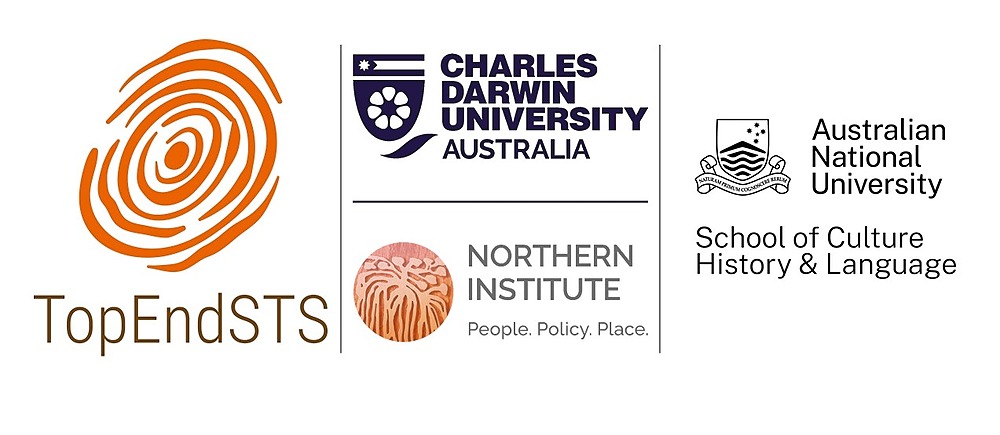Finding grounds for making and doing STS: Talking across territories
Event description
In the lead up to the Australian Science and Technology Studies (AusSTS) conference, please join us as Professor Helen Verran and Dr Michaela Spencer from Charles Darwin University (CDU)/TopEnd Science and Technology Studies (TopEndSTS) join a range of Australian National University (ANU) academics to ‘talk across territories’ about making and doing science and technology studies (M&D STS) from the ground up. By territories, we mean experiences in the Northern Territory and the Australian Capital Territory (and beyond), but more importantly we also mean epistemic, disciplinary and other ways of making, doing and performing knowledge(s) differently but together.
In conversation, presenters will share short provocations that seek to draw inspiration in devising novel methods for contemporary inquiry by putting two recently recognised STS inquiry methods into conversation. The first is 'Making and Doing STS' as a method focussed on practices-in-practice in generating STS knowledge and expertise that extends beyond academic papers or books, and which has a growing presence within STS through the American and European STS associations such as the Society for the Social Studies of Science (4S) and the European Association for the Study of Science and Technology (EASST). The second is 'Ground Up Inquiry' as a situated method researching entanglements of politics and epistemics that has emerged through research initiatives jointly authorised by Yolngu Aboriginal Australian institutions and modern university institutions other the last 40 years in northern Australia. Always pursued in partnerships, Ground Up inquiry is committed to making multiple traditions of knowledge making and doing mutually visible where disparate cosmologies are being connected and yet kept separate. The approach recognises such working together as a practice of dual academy research, where protocols and ethos need to be explicitly articulated, nurtured, and maintained with care.
Join Helen, Michaela and ANU-based TopEndSTS friends as we think together and find ground in making and doing STS knowledge(s) informed by practice and places.
As part of placing knowledge production, we also seek to turn our attention not just to STS as a field of knowledge, but to the STS knower themselves/ourselves. In the second half of the program, we invite attendees to contribute their own experiences by:
- Offering an example or an idea that is a tool or technique of making and doing STS knowledge; and/or
- Sharing insights or materials from a making and doing (work-in-progress) project you are involved in.
Scholars from all career levels, including HDR students, are all welcome!
Please note that this will be an in-person event only, supported by the ANU College of Asia and the Pacific’s Australia-Pacific Innovation Program.
About the Organisers
Helen Verran is an ethnographer. The question that animates much of her teaching, research, and scholarly writing is ‘How can ethnographic approaches to research contribute in an era when numerics, algorithms, and big data increasingly dominate decision making?’ In the absence of ethnographic approaches, first person experience becomes irrelevant in the knowledge work that informs policy and governance. Too much of what it means to be human becomes lost and missing. Helen has worked in the Northern Territory on and off since 1987. Most of her work has been with Indigenous organisations particularly focussed in Arnhem Land. She has investigated use of digital technologies, environmental management, and provision of education in remote Indigenous settlements.
Michaela is a Senior Research Fellow with the Northern Institute at Charles Darwin University. Her background is in environmental science, sociology, geography and Science and Technology Studies (STS). Her current research involves working from the ‘Ground Up’ with Indigenous knowledge authorities, and differing traditions of knowledge and governance. This involves collaborative research for policy development, and engaging with government, service providers, university staff and Indigenous people in remote communities. So far this research has been focused around issues such as disaster resilience, emergency management, governance and leadership, remote engagement and coordination, volunteering and women’s health.
Kirsty Wissing is a Research Fellow with the School of Culture, History and Language and the Institute for Climate Energy and Disaster Solutions at The Australian National University (ANU). She is also a Visiting Scientist at the Australian Government’s Commonwealth Scientific and Industrial Research Organisation (CSIRO) in their Water Security Program. Trained as an anthropologist, Kirsty’s research considers Indigenous and customary values, relationships with and resource responsibility for tangible and intangible environments in Australia and Ghana. Her work sits at the intersection of Indigenous and non-Indigenous science approaches to environmental management and disaster mitigation, including flooding, invasive species incursions and loss of biodiversity and considers tech-mitigation approaches such as genetic engineering/synthetic biology as well as nature-based solutions.

Tickets for good, not greed Humanitix dedicates 100% of profits from booking fees to charity
